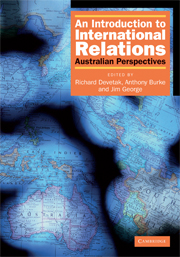Book contents
- Frontmatter
- Contents
- List of tables, figures and boxes
- List of contributors
- Preface and acknowledgments
- An introduction to international relations: the origins and changing agendas of a discipline
- 1 Theory and practice in Australian international relations: the search for identity and security
- Part 1 Theories of international relations
- Part 2 The traditional agenda: states, war and law
- Part 3 The new agenda: globalisation and global governance
- 20 Multilateral economic institutions
- 21 Global trade
- 22 Global finance
- 23 Non-state actors: multinational corporations and international non-governmental organisations
- 24 Global poverty and inequality
- 25 Globalisation and its critics
- 26 The globalisation of Islam
- 27 Global terrorism
- 28 Humanitarianism and armed intervention
- 29 Human rights
- 30 Migration and refugees
- 31 Global environmental politics
- 32 Global governance and the United Nations
- Glossary of terms
- Bibliography
- Index
- References
26 - The globalisation of Islam
from Part 3 - The new agenda: globalisation and global governance
- Frontmatter
- Contents
- List of tables, figures and boxes
- List of contributors
- Preface and acknowledgments
- An introduction to international relations: the origins and changing agendas of a discipline
- 1 Theory and practice in Australian international relations: the search for identity and security
- Part 1 Theories of international relations
- Part 2 The traditional agenda: states, war and law
- Part 3 The new agenda: globalisation and global governance
- 20 Multilateral economic institutions
- 21 Global trade
- 22 Global finance
- 23 Non-state actors: multinational corporations and international non-governmental organisations
- 24 Global poverty and inequality
- 25 Globalisation and its critics
- 26 The globalisation of Islam
- 27 Global terrorism
- 28 Humanitarianism and armed intervention
- 29 Human rights
- 30 Migration and refugees
- 31 Global environmental politics
- 32 Global governance and the United Nations
- Glossary of terms
- Bibliography
- Index
- References
Summary
Introduction
This chapter presents an examination of the place of Islam in international relations today. It begins by offering a brief account of Islam's growth and evolving identity. It then outlines Islamic militancy's destabilising effects before discussing Islamist globalism, Muslims in the West and efforts to counter Western hegemony.
Islam in the world today
There are in excess of 1.5 billion Muslims in the world. The great bulk of this population lives in South and Southeast Asia, where Muslims constitute the largest religious group. States with Muslim population majorities are often called Muslim states, regardless of the system of government and political system. But there are also significant Muslim populations in other states. Population movement in the second half of the twentieth century has led to the growth of Muslim communities in Europe, the US and Australia. Muslim migration to Europe seems to have closely reflected colonial links, so that the biggest Muslim community in the UK is from South Asia where the British Empire held sway, while Muslims from Algeria constitute a significant community in France. This picture, however, is fast evolving and Muslim minority groups in non-Muslim states are becoming increasingly heterogeneous in ethnic background and creed.
The demographic spread of Muslims has led to some key questions about identity, community and citizenship. Islam emerged in the Arabian Peninsula in the seventh century, but was not tied to that geography.
- Type
- Chapter
- Information
- An Introduction to International RelationsAustralian Perspectives, pp. 307 - 317Publisher: Cambridge University PressPrint publication year: 2007



